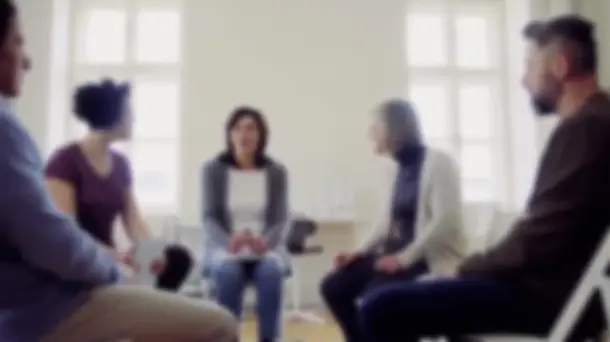Welcome to Narcotics Anonymous
What is our message? The message is that an addict, any addict, can stop using drugs, lose the desire to use, and find a new way to live. Our message is hope and the promise is freedom.

“When new members come to meetings, our sole interest is in their desire for freedom from active addiction and how we can be of help.”
It Works: How and Why, “Third Tradition”
Is NA for me?
This is a question every potential member must answer for themselves. Here are some recommended resources that may be helpful:
Need help for family or a friend?
NA meetings are run by and for addicts. If you're looking for help for a loved one, you can contact Narcotics Anonymous near you.
Subscribe to NAWS Emails
Sign up to receive Just for Today and SPAD daily meditation emails, as well as NAWS News, NAWS Updates, and more.
Never before have so many clean addicts, of their own choice and in free society, been able to meet where they please, to maintain their recovery in complete creative freedom.
Basic Text, “We Do Recover”
Recovery Quicklinks:
Service Quicklinks:
Narcotics Anonymous sprang from the Alcoholics Anonymous Program of the late 1940s, with meetings first emerging in the Los Angeles area of California, USA, in the early Fifties. The NA program started as a small US movement that has grown into one of the world's oldest and largest organizations of its type.
Today, Narcotics Anonymous is well established throughout much of the Americas, Western Europe, Australia, and New Zealand. Newly formed groups and NA communities are now scattered throughout the Indian subcontinent, Africa, East Asia, the Middle East, and Eastern Europe. Narcotics Anonymous books and information pamphlets are currently available in 49 languages.
Information About NA
Daily Meditations
Just for Today
June 02, 2025 |
Sick and tired |
| Page 160 |
| “We wanted an easy way out…When we did seek help, we were only looking for the absence of pain.“ |
| Basic Text, p. 5 |
| Something's not working. In fact, something's been wrong for a long time, causing us pain and complicating our lives. The problem is that, at any given moment, it always appears easier to continue bearing the pain of our defects than to submit to the total upheaval involved in changing the way we live. We may long to be free of pain, but only rarely are we willing to do what's truly necessary to remove the source of pain from our lives. Most of didn't begin seeking recovery from addiction until we were “sick and tired of being tired and sick.” The same is true of the lingering character defects we've carried through our lives. Only when we can't bear our shortcomings one moment longer, only when we know that the pain of change can't be as bad as the pain we're in today, are most of us willing to try something different. Thankfully, the steps are always there, no matter what we're sick and tired of. The irony is that, as soon as we make the decision to begin the Twelve Step process, we realize our fears of change were groundless. The steps offer a gentle program of change, one step at a time. No single step is so frightening that we can't work it, by itself. As we apply the steps to our lives, we experience a change that frees us. |
| Just for Today: No matter what prevents me from living a full, happy life, I know the program can help me change, a step at a time. I need not be afraid of the Twelve Steps. |
A Spiritual Principle a Day
June 02, 2025 |
Learning to Love Ourselves |
| Page 159 |
| “We've begun to see that God's will for us is the ability to live with dignity, to love ourselves and others, to laugh, and to find great joy and beauty in our surroundings.“ |
| It Works, Step Eleven |
| When we are new in NA, we may hear someone say they will love us until we learn to love ourselves. Despite our self-centeredness, many of us arrive in the program devoid of self-esteem and incapable of loving anyone, perhaps most especially ourselves. Over time we learn how to value ourselves. Simple acts of self-care at the beginning of each day can be a good place to start. Maybe we make the bed, set an intention for the day, or do a daily reading. In the Basic Text story “Just Say Yes” one member shared, “I discovered that breakfast is a spiritual principle: With honesty, open-mindedness, willingness, and breakfast, we're well on our way.” NA is a practical program that we use in every area of our lives. Sometimes this means nurturing our physical selves or contemplating HALTS as suggested in the Basic Text: “Are we too hungry, angry, lonely or tired? Are we taking ourselves too seriously?” It's easy to forget how the state of our body can deeply affect our sense of well-being. The contrast between a life in recovery and a life of active addiction is clear. We can find gratitude in the simple benefits of recovery, like food in the cupboard and a safe place to eat it. If we think about the mornings we experienced before we got clean, we might remember feeling sick and desperate or cold and hungry. The NA program gives us a way out of that darkness and into a day full of possibilities. Through working the Steps, we learn to love ourselves and the world around us. We find ways to take care of ourselves and treat ourselves with kindness. And we share that love with others, perhaps telling a newcomer we will love them until they learn to love themselves. |
| ——— ——— ——— ——— ——— |
| I will contemplate my physical, emotional, and spiritual well-being and reinvigorate my morning routine. I will take time to consciously reflect on the abundance recovery has brought to my life. |
Do you need help with a drug problem?
“If you’re new to NA or planning to go to a Narcotics Anonymous meeting for the first time, it might be nice to know a little bit about what happens in our meetings. The information here is meant to give you an understanding of what we do when we come together to share recovery…”
Subscribe to NAWS Emails
Sign up to receive NAWS Updates and NAWS News emails as well as Just for Today and SPAD daily emails.




